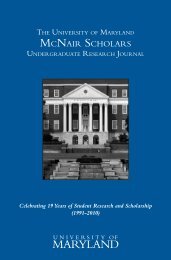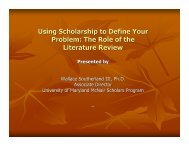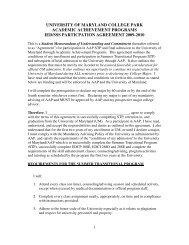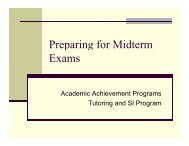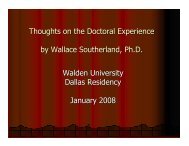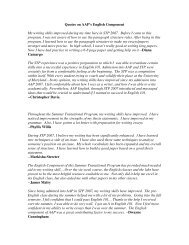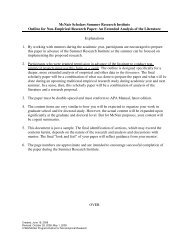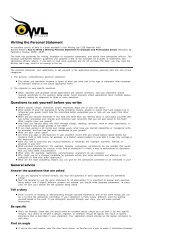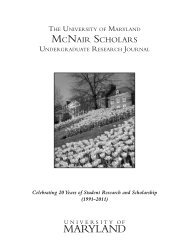mcnair scholars - Academic Achievement Programs - University of ...
mcnair scholars - Academic Achievement Programs - University of ...
mcnair scholars - Academic Achievement Programs - University of ...
Create successful ePaper yourself
Turn your PDF publications into a flip-book with our unique Google optimized e-Paper software.
36 <strong>University</strong> <strong>of</strong> Maryland • Inaugural Edition<br />
<strong>University</strong> <strong>of</strong> Maryland • Inaugural Edition 37<br />
Constructing Race in Campaign 2008:<br />
A Textual Analysis <strong>of</strong> the PBS All American<br />
Presidential Forum featuring the Democratic<br />
candidates at Howard <strong>University</strong><br />
Shavonne Shorter<br />
Mentor: Dr. Stacey L. Connaughton, Assistant Pr<strong>of</strong>essor<br />
Department <strong>of</strong> Communication<br />
Purdue <strong>University</strong><br />
Abstract<br />
History was made on June 28, 2007 when candidates for United States presidency<br />
for the first time debated exclusively about race. This article provides a close textual<br />
analysis <strong>of</strong> the first PBS All America Presidential Forum featuring the Democratic<br />
candidates for United States President, to discover how these individuals construct<br />
race. We find that candidates constructed race in this debate as a direct synonym<br />
for African Americans. Additionally, African Americans are being constructed by<br />
the candidates as poor, lacking education, and destined for failure. Implication <strong>of</strong><br />
these constructions for discourse about race and politics in the american political<br />
campaign context, as well as for how African Americans may view themselves visa-vis<br />
the U.S. political system, are discussed.<br />
How Does Media Coverage in<br />
the Washington Post Depict Young People<br />
Engaged in Violent Crimes?<br />
Tahera Sparks<br />
Mentor: Dr. Alice Bonner, Lecturer, Journalism Department<br />
<strong>University</strong> <strong>of</strong> Maryland, College Park<br />
Abstract<br />
The goal <strong>of</strong> my research is to find out if the media has a direct effect in the<br />
stereotyping <strong>of</strong> minority teens and the shaping <strong>of</strong> public policy that affects teen<br />
minorities. The media is a social construction that influences the behaviors <strong>of</strong> teens<br />
and exaggerates the magnitude <strong>of</strong> violence that actually occurs. The newspaper<br />
elevates the level <strong>of</strong> crimes because <strong>of</strong> the number <strong>of</strong> times the stories are presented<br />
and the descriptions used to illustrate the crimes. This creates stereotypes and<br />
promotes that it is normal for young people to commit crimes and that young<br />
people commit the most crimes. The Washington Post newspaper, from June 13 th -<br />
July 15 th was used to determine if there is a correlation between teen violence and<br />
racial segregation on public opinion discrepancies in the presentation <strong>of</strong> the race,<br />
proximity, age and sex <strong>of</strong> the accused and victims that could affect racial stereotypes<br />
and public policy. Each story was analyzed to find out the date <strong>of</strong> publication, the<br />
number <strong>of</strong> times an article was written for the given story, the length <strong>of</strong> the article,<br />
location <strong>of</strong> the story in the newspaper, and the language used in the description<br />
<strong>of</strong> the victims and the accused (i.e. thug or gang). My research has found that the<br />
frequency <strong>of</strong> the stories in the post depict young people as violent and show that<br />
they are committing more crimes than they really are. This research is important<br />
because the depiction <strong>of</strong> youth in a widely read newspaper could alter the general<br />
perception <strong>of</strong> other readers and create false stereotypes that teens are committing<br />
more crimes than they really are.



